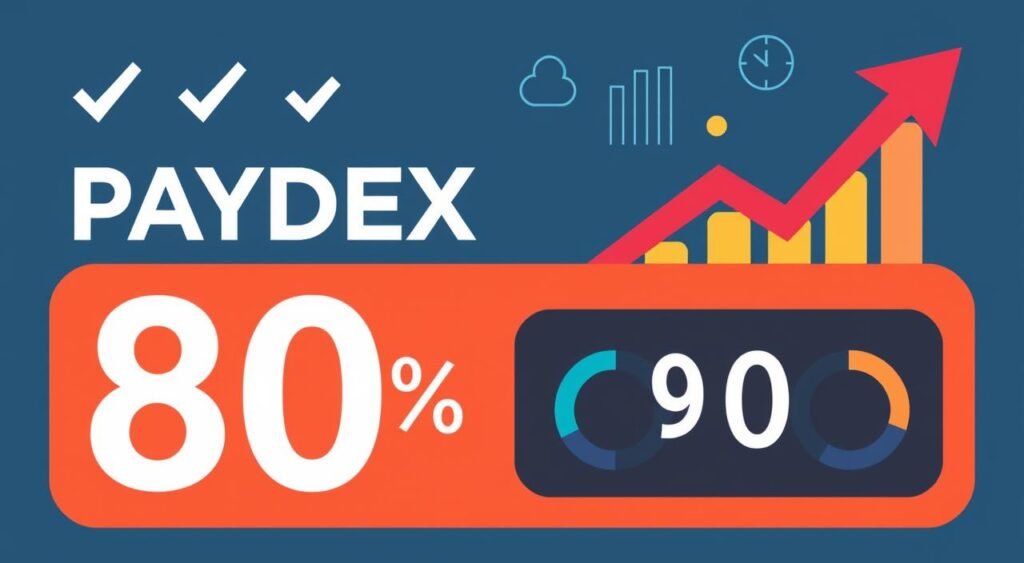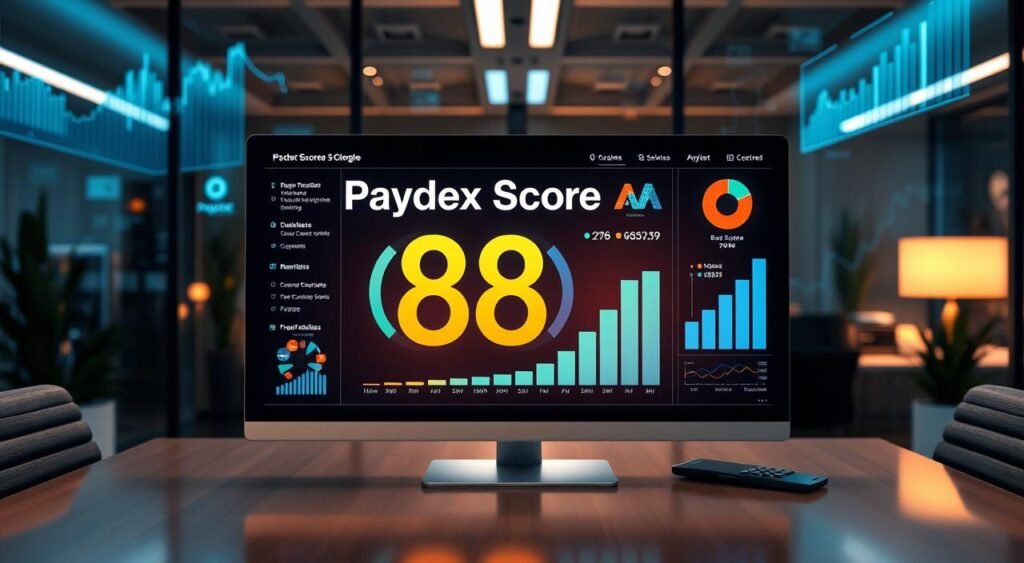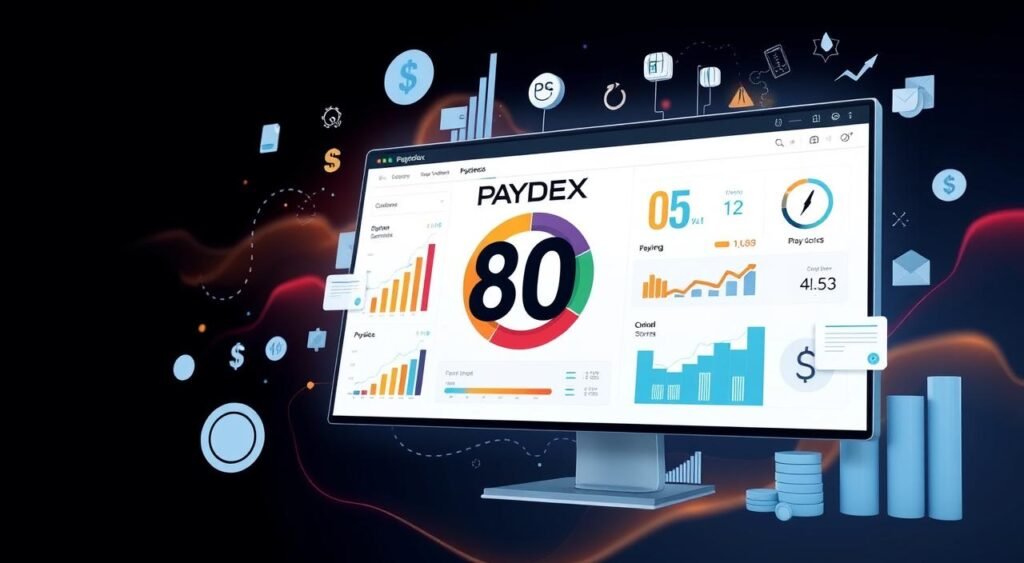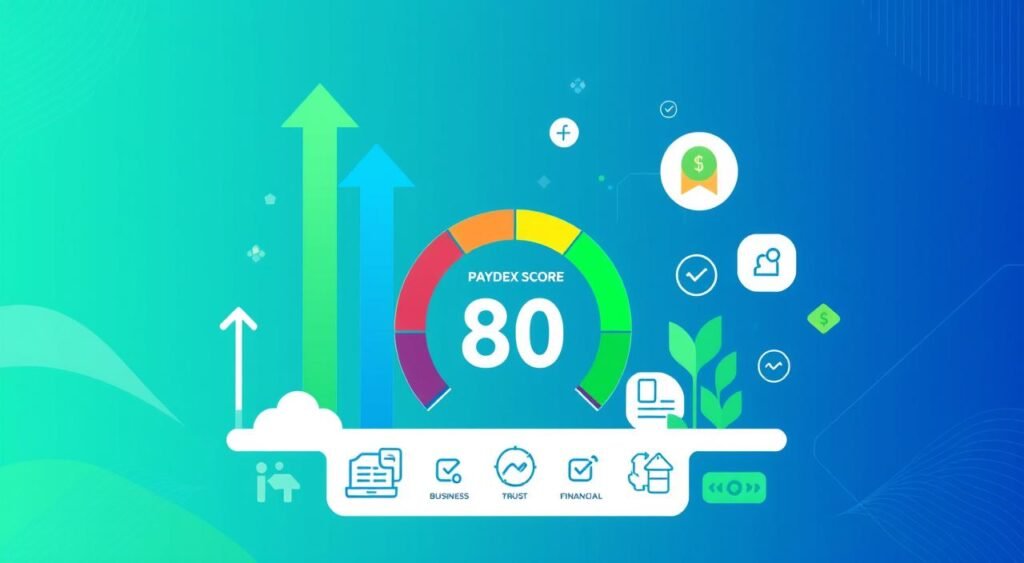What if a single number could unlock your business’s financial future? Enter the PAYDEX score – a powerful tool in business credit building that can make or break your financial credibility assessment. This unique metric, ranging from 0 to 100, offers a glimpse into your company’s payment history and financial health1.
Understanding and improving your PAYDEX score is crucial for fueling business growth. It directly impacts your ability to secure loans, lease business locations, and establish favorable terms with suppliers. A high score can open doors to better financing options and increased credibility in your industry2.
Let’s dive into the world of PAYDEX scores and uncover how you can leverage this vital credit score management tool to boost your business’s financial standing. From timely payments to strategic vendor relationships, we’ll explore the key factors that influence your score and provide actionable tips to help you climb the PAYDEX ladder.
Key Takeaways
- PAYDEX scores range from 0 to 100, with higher scores indicating better payment performance
- A score of 80 or above is considered good and reflects prompt payments
- Timely or early payments are crucial for maintaining a high PAYDEX score
- Separating business and personal credit accounts is essential for accurate scoring
- A strong PAYDEX score can lead to better financing options and increased credibility
- Regular monitoring and reviewing of your business credit report is important
- Working with vendors who report to Dun & Bradstreet can help build your score
Understanding the PAYDEX Score
The PAYDEX score is a critical tool for credit score management in the business world. It’s a measure of your company’s financial responsibility and plays a key role in business credit building.
Definition and Importance
PAYDEX is a business credit score created by Dun & Bradstreet (D&B) that tracks how promptly a company pays its bills. This score is vital for businesses seeking credit, as it helps lenders assess creditworthiness, much like personal credit scores do for individuals3.
Score Range and Interpretation
PAYDEX scores range from 0 to 100, with higher scores indicating lower risk of late payments34. A score of 80 or above is considered good and means you’re paying on time or early. Scores below 80 suggest late payments, which can harm your business credit profile.
How It Differs from Personal Credit Scores
Unlike personal credit scores, PAYDEX focuses solely on business-to-business transactions. It’s calculated based on your payment history over the past 12 months, emphasizing recent payment behaviors3. This makes PAYDEX more dynamic and responsive to changes in your financial responsibility.
“A high PAYDEX score can lead to better credit terms, financing options, and improved chances of obtaining credit.”
To improve your PAYDEX score, focus on paying bills on time or early, managing credit utilization, and establishing strong trade lines. Regular monitoring of your business credit reports is also crucial for maintaining a healthy score and demonstrating financial responsibility3.
The Role of PAYDEX in Business Credit
PAYDEX plays a crucial role in business credit by providing a snapshot of your company’s payment history. This score, ranging from 1 to 100, is a key factor in financial credibility assessment. Scores of 80 and above are considered good, indicating strong payment practices5.
Your PAYDEX score impacts various aspects of your business operations:
- Loan applications
- Lease agreements
- Supplier credit terms
- Potential business partnerships
A high PAYDEX score can unlock better financing opportunities and more favorable credit terms. This contributes significantly to your business credit building efforts and overall growth.
The PAYDEX score is part of a broader business credit landscape. Other important scores include:
- Experian’s Intelliscore Plus (1-100 scale)
- FICO SBSS Score (0-300 range)
- Equifax’s Delinquency Risk Score (224-580 scale)6
These scores collectively paint a comprehensive picture of your business’s creditworthiness. They influence your ability to secure loans, negotiate favorable terms with suppliers, and attract reputable business partners5.
Remember, maintaining a good PAYDEX score requires consistent, early payments. This practice not only improves your score but also enhances your overall financial credibility. By focusing on timely payments and managing your credit utilization ratio, you can build a strong foundation for your business’s financial future56.
How PAYDEX Scores Are Calculated
PAYDEX scores play a crucial role in credit score management for businesses. These scores, ranging from 1 to 100, indicate how likely a company is to settle its debts on time7. Understanding the calculation method can help you optimize your payment history and boost your financial responsibility.
Payment Experiences and Tradelines
Dun & Bradstreet considers up to 875 individual business partners when calculating a company’s PAYDEX score7. To generate a score, you need at least four trade references in the last two years7. This highlights the importance of building strong relationships with vendors and maintaining a healthy credit profile.
Importance of Early Payments
Early payments significantly impact your PAYDEX score. A score above 80 indicates early payment, with a perfect score of 100 showing payments made on average 30 days in advance7. On the other hand, a score of 1 suggests being over 120 days late on payments7.
Impact of Payment Amounts
The size of your payments matters in PAYDEX score calculations. Larger payments carry more weight, affecting your score more significantly than smaller ones. To improve your score, focus on paying larger invoices early and avoiding late payments on substantial amounts.
| PAYDEX Score Range | Risk Level | Payment Behavior |
|---|---|---|
| 80-100 | Low Risk | Early payments |
| 50-79 | Moderate Risk | On-time payments |
| 1-49 | High Risk | Late payments |
To optimize your payment history and improve your PAYDEX score, establish credit relationships with reputable vendors, lease necessary equipment, and consider taking out business loans7. These actions can positively impact your score and demonstrate your financial responsibility to potential creditors and partners.

Financial Credibility Assessment: PAYDEX as a Key Metric
PAYDEX serves as a vital tool in assessing your business’s financial credibility. This score, ranging from 0 to 100, offers valuable insights into your company’s payment behavior and overall financial health8. A higher PAYDEX score indicates better payment performance, which can significantly impact your business credit building efforts.
Your PAYDEX score plays a crucial role in credit score management. It influences your ability to secure favorable loan terms, including lower interest rates and higher credit limits8. Suppliers and vendors often review this score before extending credit terms, making it an essential factor in building strong business relationships.

A robust PAYDEX score can open doors to collaboration opportunities and partnerships with reputable organizations8. It also impacts your chances of approval when applying for credit products and can lead to more favorable payment terms from suppliers9. In some cases, a high score may even result in lower insurance premiums for commercial policies.
To improve your PAYDEX score and enhance your financial credibility assessment, consider these strategies:
- Make timely payments consistently
- Reduce credit utilization
- Diversify your creditors
- Resolve any negative items on your credit report
- Separate personal and business finances
Remember, your D-U-N-S number, a unique nine-digit identifier, signifies your company’s stability and growth potential10. This number, along with your PAYDEX score, forms a comprehensive picture of your business’s creditworthiness for potential partners and lenders.
| PAYDEX Score Range | Payment Performance | Impact on Business |
|---|---|---|
| 80-100 | Excellent | Best terms, highest credit limits |
| 50-79 | Good | Favorable terms, good credit limits |
| 0-49 | Poor | Limited credit, higher interest rates |
By focusing on maintaining a high PAYDEX score, you’re not just managing your credit score; you’re building a strong foundation for your business’s financial future.
Establishing Your Business for PAYDEX Scoring
Setting up your business for PAYDEX scoring is a crucial step in business credit building. This process involves key actions that lay the foundation for effective credit score management and financial responsibility.
Obtaining a D-U-N-S Number
The first step in establishing your business for PAYDEX scoring is obtaining a D-U-N-S Number from Dun & Bradstreet. This unique nine-digit identifier serves as a business identity marker, similar to a Social Security number for individuals. The D-U-N-S Number is essential for creating a business credit file and is required for transactions with many government agencies11.

Meeting Minimum Requirements for Scoring
To generate a PAYDEX score, your business needs to meet specific criteria. You must have at least three payment experiences from two different suppliers, known as tradelines. These experiences form the basis for calculating your PAYDEX score, which ranges from 0 to 10012.
It’s crucial to work with vendors and suppliers who report payment data to D&B. This ensures that your positive payment history is reflected in your score, contributing to effective credit score management. Remember, a score of 80 or higher is considered good, while 90+ is excellent12.
“Establishing a strong PAYDEX score is a fundamental step in building robust business credit. It’s not just about getting a number; it’s about creating a solid financial foundation for your company’s future.”
By focusing on these key aspects of PAYDEX scoring, you’re taking important steps in your business credit building journey. This process not only enhances your financial responsibility but also opens doors to better credit terms and business opportunities in the future13.
Strategies for Improving Your PAYDEX Score
Boosting your PAYDEX score is crucial for effective credit score management. To improve your PAYDEX score, focus on paying bills early. Aim to settle invoices before their due dates, as this significantly impacts your score positively. Businesses can make solid progress in enhancing their PAYDEX score within 30 days14.
Establish credit accounts with suppliers who report to D&B. Maintain a consistent record of early payments, prioritizing larger invoices for maximum impact. Payment history accounts for 35% of your credit score, emphasizing the importance of timely payments to maintain a low-risk status15.
Monitor your credit report regularly and address errors promptly. Keep credit lines active and maintain low credit utilization to demonstrate responsible credit management. Maintaining a credit utilization ratio of less than 30% is advised to positively impact your business credit score15.
| Strategy | Impact on PAYDEX Score |
|---|---|
| Early Payments | Significant positive impact |
| Supplier Reporting | Builds credit history |
| Low Credit Utilization | Demonstrates responsible management |
| Regular Monitoring | Helps maintain accuracy |
Consider using tools like eCredable Business Lift to report business utility and telecom payments to credit bureaus, aiding in improving your business credit history14. By implementing these strategies for payment history optimization, you’ll be on your way to a stronger PAYDEX score and improved financial credibility.
The Importance of Timely Payments
Timely payment habits are crucial for maintaining a strong PAYDEX Score. Your payment history plays a significant role in your creditworthiness, accounting for 35% of your FICO credit score16. Embracing financial responsibility through consistent on-time payments can lead to numerous benefits for your business.
Benefits of paying before due dates
Paying bills before their due dates can significantly boost your PAYDEX Score. Early payments demonstrate strong debt repayment strategies and can improve your overall financial standing. A score of 80 indicates payments made exactly on the due date, while scores above 80 reflect early payments.
Businesses that leverage data to make informed decisions experience a 15 to 20% increase in productivity17. By prioritizing early payments, you can:
- Build trust with creditors
- Improve your business credit profile
- Increase chances of securing favorable terms on future loans
Impact of late payments on your score
Late payments can severely damage your PAYDEX Score. Lower scores indicate longer payment delays, which can hurt your business’s creditworthiness. Your creditworthiness affects various aspects of your business, including employment eligibility, insurance premiums, and access to funding16.
| Payment Timing | PAYDEX Score Impact |
|---|---|
| 30 days early | 100 (Highest score) |
| On time | 80 |
| 30 days late | 50 |
| 90 days late | 20 (Lowest score) |
Consistently paying early, especially on larger invoices, is the most effective strategy for achieving and maintaining a high PAYDEX Score. By focusing on timely payments, you demonstrate financial responsibility and improve your business’s overall financial health.
Monitoring Your PAYDEX Score
Keeping a close eye on your PAYDEX score is crucial for effective credit score management. Regular credit monitoring helps you track improvements, spot potential issues, and address any errors promptly. This practice ensures your score accurately reflects your payment performance, a key aspect of financial credibility assessment.
Did you know that 72% of business owners are unaware of their business credit scores18? This lack of awareness can be detrimental, as understanding your business credit makes you 41% more likely to secure financing approval18. To avoid falling into this uninformed majority, consider these monitoring options:
- D&B’s CreditSignal: Offers free access for 14 days, then notifies you of changes
- Third-party sites like Nav: Provide free PAYDEX Score checks
- D&B’s paid services: Offer continuous access for in-depth monitoring
Remember, errors in business credit reports can occur in up to 25% of cases18. By regularly monitoring your PAYDEX score, you’re not just tracking your financial health; you’re safeguarding your business against potential mistakes that could impact your creditworthiness.
| PAYDEX Score Range | Payment Behavior | Credit Implication |
|---|---|---|
| 80-100 | Early payment | Excellent creditworthiness |
| 70-79 | On-time payment | Good, meets lender requirements |
| 65-69 | 5-9 days late | Fair, may face credit difficulties |
| Below 65 | 15+ days late | Poor, challenging to access credit |
Understanding these score ranges can help you interpret your PAYDEX score effectively. A score of 75 is considered reasonably good, while scores over 80 indicate early payments19. Strive to maintain a score above 70 to meet typical lender requirements and ensure smooth access to credit lines for your business.
Building Strong Vendor Relationships
Vendor relationship maintenance is crucial for business credit building and financial credibility assessment. In today’s economy, companies rely more on supplier components and services than ever before20. This makes cultivating strong vendor relationships essential for your business success.
Importance of trade references
Trade references play a vital role in your PAYDEX score. By fostering healthy vendor relationships, you can reduce risks and unlock cost-saving opportunities21. Clear communication and setting measurable goals aligned with your business objectives are key to successful vendor relationship management21.
Establish stringent vendor selection criteria and conduct regular performance reviews21. This approach helps in building a network of reliable trade references, boosting your financial credibility assessment. Remember, strong supplier relationships lead to cost savings and reduced issues with availability, quality, and product delays20.
Encouraging vendors to report payments
To improve your PAYDEX score, encourage your vendors to report payment experiences to D&B. Open communication channels with suppliers and discuss the importance of reporting2021. You can use tools like email, video conferencing, and collaboration platforms to enhance communication efficiency21.
Consider using D&B’s CreditBuilder products if vendors don’t report. This proactive approach to submitting payment information can significantly improve your PAYDEX Score and overall business credit profile. By maintaining consistent early payments and good vendor relationships, you’re not only building positive trade references but also mitigating various supply chain vulnerabilities2022.
FAQ
What is the PAYDEX Score?
How does the PAYDEX Score differ from personal credit scores?
Why is the PAYDEX Score important for businesses?
How are PAYDEX Scores calculated?
How can I establish my business for PAYDEX scoring?
What strategies can I use to improve my PAYDEX Score?
Why are timely payments crucial for maintaining a good PAYDEX Score?
How can I monitor my PAYDEX Score?
Why are strong vendor relationships important for building a good PAYDEX Score?
Source Links
- Paydex Scores: Your Key to Small Business Financial Success. – https://www.paycron.com/blog/unlocking-financial-success-a-comprehensive-guide-to-paydex-scores-for-small-businesses
- How to Get a PAYDEX Score of 80: The Essential Guide – https://www.unitedcapitalsource.com/blog/paydex-score-80/
- Paydex | HighRadius™ | Autonomous Finance | A/R Management Software – https://www.highradius.com/glossary/paydex-meaning-and-definition/
- Business credit scores explained – https://www.creditkarma.com/advice/i/business-credit-scores-explained
- What Is a Good Business Credit Score? – https://www.americanexpress.com/en-us/business/trends-and-insights/articles/what-is-a-good-business-credit-score/
- How to Check Business Credit Scores and Reports | Nav – https://www.nav.com/blog/how-to-check-business-credit-431017/
- What Is a Paydex Score? – Heartland Financial Group – https://heartlandfinancialgroup.com/paydex-score-what-is-it/
- What is a Paydex Score — Key to Business Creditworthiness! – https://www.linkedin.com/pulse/what-paydex-score-key-business-creditworthiness-paycron-inc-cptee
- Business Credit Scores: Everything You Need to Know – https://rates.fm/cards/business-credit-scores/
- CNC Intelligence Reviews: DUNS by D&B – https://cncintel.com/reviews/duns-dandb/
- How to Establish & Improve Your Business Credit Score – https://www.hud.gov/sites/dfiles/SDB/documents/Business Credit-How to Establish Improve Your Business Credit.pdf
- Business Credit 101 | How It Works – https://www.businesscredit101.com/how-it-works
- paydex Archives – Business Credit – https://businesscreditblogger.com/tag/paydex/
- How to Build Business Credit in 30 Days | eCredable – https://business.ecredable.com/resources/blog/how-to-build-business-credit-in-30-days
- Business Credit Score: Unlock New Growth Opportunities – https://loanbud.com/business-credit-score-unlock-new-growth-opportunities/
- Creditworthiness: How to Check and Improve It – https://www.investopedia.com/terms/c/credit-worthiness.asp
- What is The Importance of Accurate and Timely Financial Reporting for Saas Companies? – Consero Global – https://conseroglobal.com/resources/what-is-the-importance-of-accurate-and-timely-financial-reporting-for-saas-companies/
- Business Credit Scores and Reports | Nav – https://www.nav.com/business-credit-scores/
- Corporate Credit Score – Asset Profile – https://assetprofile.com/corporate-credit-score/
- Managing Relationships with Suppliers and Vendors You Use – https://www.apu.apus.edu/area-of-study/business-and-management/resources/managing-relationships-with-suppliers-and-vendors-you-use/
- Vendor Relationship Management | Mailchimp – https://mailchimp.com/resources/vender-relationship-management/
- Guide to Vendor Risk Assessment | Smartsheet – https://www.smartsheet.com/content/vendor-risk-assessment

